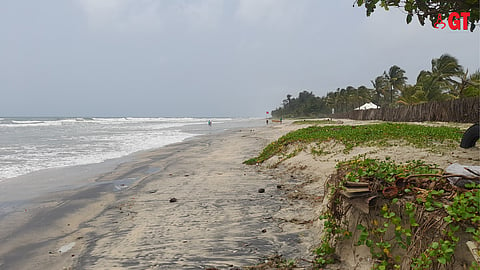

Cavelossim Beach, at the tip of South Goa, is desolate during the day except for the occasional couples who decide to saunter past the breaking waves. Compared to North Goa, this part of the south defines a pristine beach.
With the monsoon fury abating and the tourist season set to take off again, motifs of Indian tourists can be seen around Cavelossim; taxis can be seen moving around against the backdrop of the laid-back Goan lifestyle.
Despite what many in the tourism industry would term slow traffic, locals in Cavelossim do not appear perturbed. As driver Santan says, “We may get one trip a day, but it is enough for us because apart from the fee, we are well-tipped by our clients.”
A big stretch of the beach is dotted with vegetation and dunes that make viewing the beach from the road difficult.
“A big part of this coast still belongs to Goans. Outside people have not been able to buy this land. Probably because of disputes within families,” disclosed a Goan real estate developer from the area while trying to explain the vastness of the natural beauty.
Cavelossim is flanked on one side by the beach and on the other by River Sal. It is this combination that sets this beach apart from the others in Goa.
“Our rooms are amongst the most expensive in Goa, and yet our occupancy is good because we host big corporate events,” disclosed a senior executive of a 7-star establishment.
“We offer our guests the best water sports facilities on River Sal and have the best in-house entertainment for our guests. The people who choose to come here are different from people opting for North Goa,” confirms the manager of another resort, on the condition of anonymity.
Francis is a Goan, sitting on the beach waiting for his canoes to return with a bumper catch. As he waits, he says, “Money is important, but as a village, we do not tolerate illegal constructions, we want our place to be clean and kept clean by all visitors. Peace is equally important.”
“Land in Cavelossim is priced between Rs 15,000 to a maximum of Rs 20,000 a metre because of the high tide line rules and other CRZ stipulations. Most of the vacant land can be used to build shacks or temporary structures,” states Desmond from the area.
In one corner of the beach is a Drishti cabin being inspected by an officer. “We are doing maintenance work these days. The season around this area picks up in November and goes on till about January,” observed the Drishti officer.
“There has been a sharp decline of foreigners coming in the last five years and it is because of the effects of recession around the world. There were around three hundred and fifty guests for Christmas and New Year celebrations last year. Around fifty were foreigners,” disclosed the F& B manager of a resort.
“The cream of people come to our village. We do not host riff-raffs. The culture in North Goa is different from South Goa and that can be seen in what we offer and what they offer. And, we are not in a mood to compromise,” says Reina, who is the daughter of a landowner.
The evidence of what tourism offers in the North and South is palpable, but for how long?